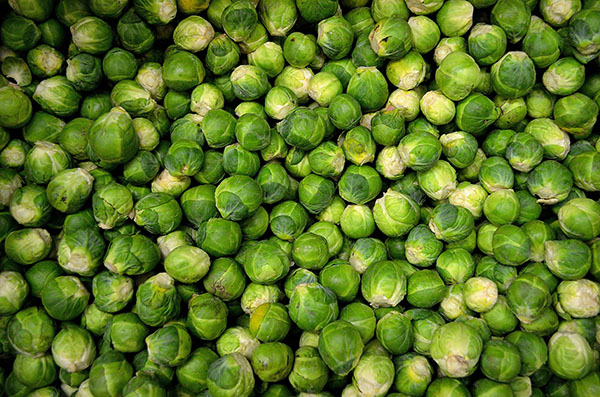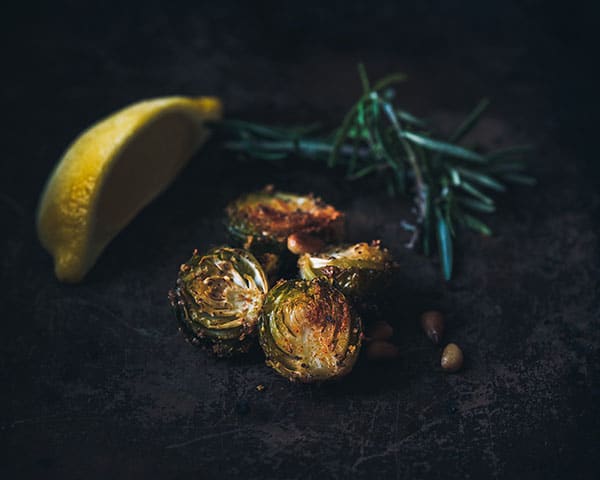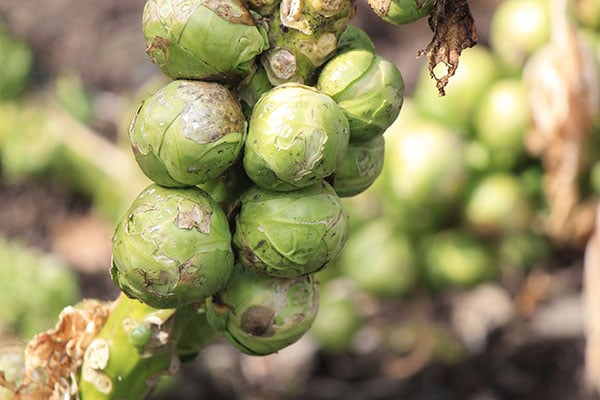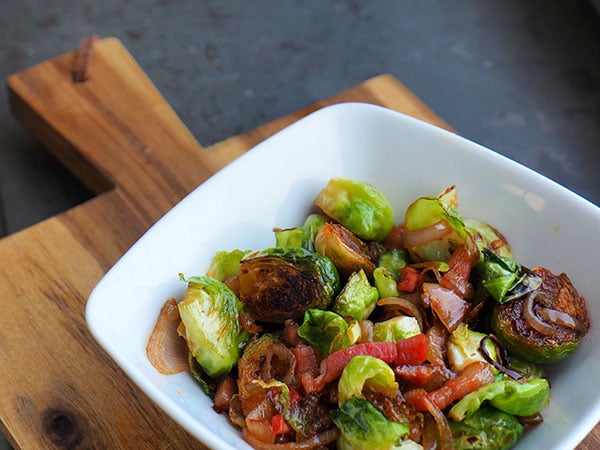Questions answered in this article:
- What’s the best way to grow brussel sprouts?
- Are brussel sprouts good for you?
- Is a brussel sprout a vegetable?
- How much fibre is in a serve of brussel sprouts?
We all love roast potatoes, pumpkin and carrot for a hearty winter vegetable. But it’s time to make some room on our plates for one of the most delicious vegetables (although debated by some) of all—the brussel sprout. Yes, you read correctly.
Since 14th century Europe, brussel sprouts have been grown and used in a variety of meals, but often get a bad rap as a bland tasting—and let’s be honest, bad smelling—vegetable. However, in this article, you’ll discover how to best cook AND grow brussel sprouts at home—even if you don’t love them right now. Yes, we are going to show you how to make brussel sprouts taste so good, even fussy eaters will love them.

Brussel Sprout Nutrition
What is a brussel sprout? Is it a vegetable? Fruit?
Brussel sprouts are small leafy green vegetables that grow from the ground. They are members of the Brassica family, which also gave us the more popular broccoli, cauliflower and cabbage.
Are brussel sprouts actually good for you?
The short answer is, yes, brussel sprouts are good for you. Half a cup of these delicious veggies contains:
- Roughly 22 calories (50 grams).
- 7g of protein.
- 9g of fibre.
- Essential Omega-3 fatty acids.
- Vitamin A, which can be beneficial to our immune systems and growth.
- Vitamin C for boosting immunity.
- Vitamin K, which is important for preventing blood clotting and benefitting bone health.
Convinced you need to grow brussel sprouts in your own garden now?

Brussel Sprout Growing Guide
How long do Brussel sprouts take to grow?
From the time of planting to harvesting, you can expect to be enjoying your home grown brussel sprouts within around 3 months.
When should you plant Brussel sprouts?
Brussel sprout plants thrive in the cooler months, so add them to your winter garden maintenance list. Many people believe the cooler weather gives them a sweeter taste and enhances the flavour.
Tip: Begin planting them early Autumn, if possible, so they reach maturity during winter.
What is the best way to grow brussel sprouts?
1. Plant your brussel sprouts.
You don’t need much space or many resources to build your own vegetable garden, but you should spend some time making sure you have a good area to plant in and have all your supplies ready.
What you’ll need to plant and grow brussel sprouts:
- Brussel sprout seeds or seedlings.
- Good quality, firm soil.
- A planter or small pots with drainage.
- Mulch
- Fertiliser
Brussel sprouts prefer to be in a sunny spot, although can tolerate some shady areas. If you are growing your own brussel sprouts from seeds, we recommend first planting them in modular seed trays and then carefully transferring into a pot or planter that has sufficient drainage.
Make sure to use a firm, good quality soil when planting. Once your seedlings are ready, we suggest adding a layer of mulch on top of the soil to help keep the area moist.
Tip: If you are growing multiple plants, be sure to give them sufficient space between one another. We recommend at least 90cm apart.
2. Keep your plants well-watered and fertilised.
Brussel sprouts prefer to be kept moist, but they do not like to be soaked. A good watering every week should be perfect.
You can also add a good fertiliser every month or so to help keep them healthy and boost growth.

3. Keep pests off of your brussel sprout plants.
While this plant is mostly disease-free and relatively easy to grow, keep an eye out for common garden pests who like to munch on leafy greens! Caterpillars, flies and even possums are known to love a good brussel snack.
A fine mesh or chicken wire over the plant can help deter these pests.
4. Use a stake to keep your brussel sprout plant from falling over.
Once your brussel sprout plants begin to grow, they are at risk from breaking or falling over in high wind. One solution is to dig a stake or larger sturdy stick into the ground and using twine to gently tie the plant stem to it. This will provide some support for the plant to grow.
5. Harvest your brussel sprouts when they’re about the size of an egg.
When your brussel sprouts are fully mature, they are ready to harvest! The easiest way to identify this is when they become hard, a deep green colour and mature in size to about 3–4 centimetres, or about the size of an egg!
The vegetables lower on the plant will often mature faster than those higher up, so these will be the first ones to harvest. Cut or twist of the brussel sprouts, and they are ready to enjoy

How to Make Brussel Sprouts Taste Good
Now you have your own supply of these delicious vegetables, get adventurous with your recipes! Brussel sprouts are perfect when boiled, fried, roasted, barbecued or even eaten raw!
Our favourite method of cooking them is to roast them in olive oil, salt and pepper until they are nice and crispy! This makes the perfect side dish for a Sunday roast or scattered in a salad.
Or, a popular keto dish is to fry up brussel sprouts with bacon bits followed by a little bit of cream to finish them off.
Tip: Keep an eye on your cooking times. When cooked right, brussel sprouts should be slightly sweet and nutty. Overcooking can lead to the infamous bad taste and smell.

Feature photo by Keenan Loo on Unsplash
Ready to begin growing your own brussel sprouts?
Find a local nursery for all the equipment you need to get started!





